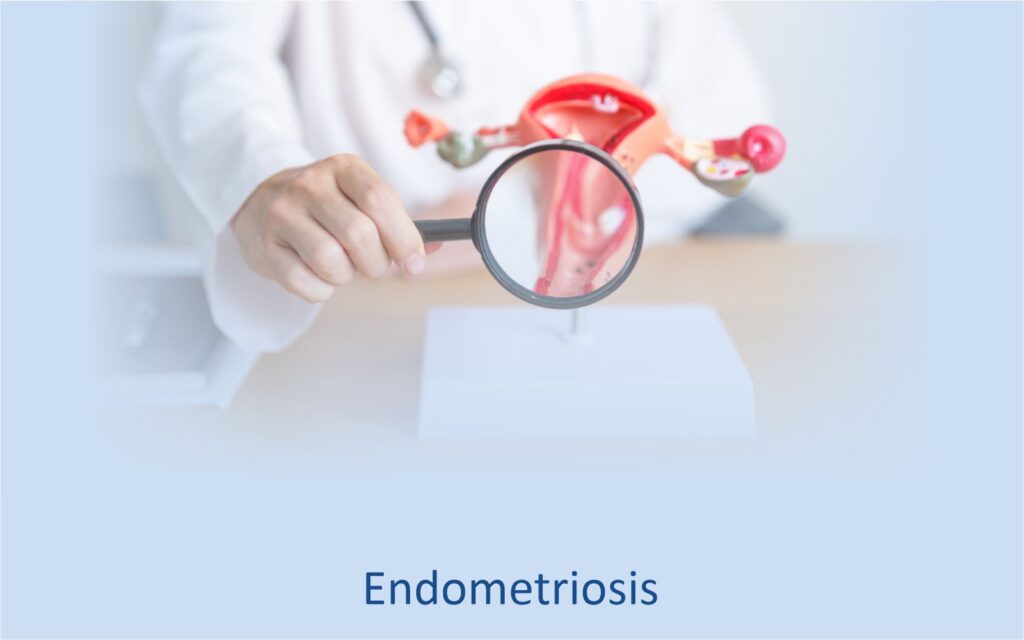The pain associated with endometriosis is often cyclical, typically intensifying before and during menstruation and easing afterward. However, in some cases, individuals with endometriosis may not exhibit any noticeable symptoms at all.
Endometriosis

What is Endometriosis?
Endometriosis is a major contributor to female infertility, affecting approximately 25–30% of women struggling to conceive. This condition occurs when the endometrium – the tissue that normally lines the uterus—starts growing outside the uterine cavity. In such cases, the tissue may spread to the ovaries, fallopian tubes, the peritoneum, or even the intestines.
What are the symptoms of endometriosis?
Around 30–50% of women diagnosed with endometriosis experience challenges with fertility. The most common symptom associated with this condition is pain, which can present in various forms, including:
- Menstrual cramps or pain during periods
- Discomfort or pain during intercourse
- Difficulty conceiving (infertility)
- Lower abdominal pain
- Pain in the lower back
- Discomfort in the pelvic area, rectum, or vagina
- Digestive issues such as constipation, diarrhea, or bloating
- Urinary problems, especially during menstruation
What are the Causes of endometriosis?:
The exact cause of endometriosis remains unclear, but several possible factors have been identified:
- Retrograde menstruation
- Genetic predisposition
- Immune system dysfunction
Though specific risk factors are not fully established, certain conditions may increase the likelihood of developing endometriosis:
- Low Body Mass Index (BMI)
- Alcohol consumption
- Smoking
Treatment Approaches
Treatment varies depending on the patient’s age, the severity of symptoms, and fertility goals.
- For young, unmarried women, hormonal therapy is often effective in managing pain.
- For those seeking to conceive, laparoscopic surgery followed by assisted reproductive techniques like IVF/ICSI can be beneficial.
- In milder cases, laparoscopic removal of lesions followed by IUI (Intrauterine Insemination) may improve pregnancy chances.
Lifestyle Tips During Treatment
While medical treatment is essential, lifestyle habits play a supportive role. Consider the following:
- Engage in regular physical activity
- Avoid alcohol and smoking
- Stay hydrated
- Eat a balanced and nutritious diet
- Maintain a healthy sleep routine
Combining clinical care with healthy lifestyle choices can significantly improve overall outcomes in managing endometriosis.
Fast Facts:
Signs of Endometriosis
Pain during periods
Excessive bleeding with pain
Pain during physical intercourse
Happy Couples
EXCELLENT rating
Based on 12 reviewsTrustindex verifies that the original source of the review is Google. All staff is great, hospital cleaning excellent, thank for Panacea staff.. ❤️Trustindex verifies that the original source of the review is Google. Highly recommendedTrustindex verifies that the original source of the review is Google. Proper guidance and well supported staff.Trustindex verifies that the original source of the review is Google. Best Doctor I saw in 13 years of journey... After Doctor given assurance for child..... Not an single doctor I saw in 13 years who give you confidance you become a parent.... Lots of respect for patients and huminty who don't have child.... She give us Daughter after 13 years can't explain our imotion after got child...... Hats of you Doctor for your great efforts.....Trustindex verifies that the original source of the review is Google. Very good hospital.. Nd help full hospital...Trustindex verifies that the original source of the review is Google. Very good hospital And mam is also very good nd intelligent🥰.....sataff is very helpful.... Must visit for this place🙏... panacea hospital yeola And Nashik..Trustindex verifies that the original source of the review is Google. It is a very nice hospital. And mam is also very good. There is a wonderful hospital for women💯👍
L
o
a
d
i
n
g





Doctor Suggests
Book Appointment
To get a consultation with Panacea Fertility Expert:
Subscribe Now
Don’t miss our future updates! Get Subscribed Today!

